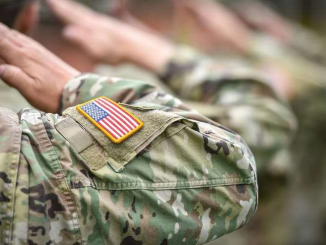
The number of medical events that triggered official reporting requirements among U.S. military pilots rose more than 1,700% from 2019 to 2022, an increase the Pentagon says was the result of COVID-19.
Last month, an Army flight surgeon and prominent opponent of the U.S. military’s now-defunct COVID-19 vaccine mandate posted data on Twitter showing that the number of reportable medical events among military aviators rose from an average 226 a year between 2016 and 2019 to 4,059 in 2022, according to the Defense Medical Epidemiology Database.
But the Pentagon says the pilots contracted the virus and that large number of positive COVID-19 cases drove up the reported medical events. The virus spread in record numbers in 2021 and 2022, according to data from the Centers for Disease Control and Prevention and the Defense Health Agency.
Read Next: 2 US Army Veterans Deported to Mexico Win US Citizenship
The flight surgeon, Lt. Col. Theresa Long, has filed for whistleblower protection and testified against the vaccine mandate, alleging that the vaccine carries risk of severe side effects — more than the illness itself. Long did not respond to a request for comment from Military.com.
According to her tweet, Long said she searched the database for all reportable events involving military pilots following the Federal Aviation Administration’s announcement in October it was easing some requirements for airline pilots regarding their cardiac health.
She, along with other opponents of mRNA vaccines, asserts that the FAA policy change was related to an increased number of patients with heart damage caused by the vaccines, according to her tweets.
Studies show, however, that the risks associated with COVID-19 vaccines are low. Rare side effects may include heart inflammation and short increases — less than a day — in a woman’s menstrual cycle, but with nearly 670 million doses given in the U.S. since Dec. 14, 2020, adverse events have remained low, even as 1.1 million Americans have died of the coronavirus.
The Defense Department said this week that the increase in reportable adverse events among military pilots is the result of COVID-19 itself, not the vaccines.
Responding to a query from Military.com, Defense Health Agency spokesman Peter Graves said Long mischaracterized the data in the defense epidemiology database, saying that she defined reportable events as those that cause “death, permanent harm or severe temporary harm,” but the Pentagon also requires that potential threats to the population, the chance of widespread transmission, or illnesses that cause disruption to training or operations be reported.
This includes COVID-19, according to Force Health Protection Guidance issued in 2020.
“The increased numbers of reportable events in 2020, 2021, and 2022 are due to the reporting of COVID-19 cases,” Graves said in an email Thursday.
In 2022, 96% of the 4,059 reportable events among pilots — 3,887 cases — were COVID-19 diagnoses, Graves said. The disease also accounted for 88% of all reportable events across all military occupations, he added.
The Defense Department has recorded 453,456 cases of COVID-19 among military personnel since the start of the pandemic in February 2020, with 2,741 service members hospitalized in the last three years and 96 deaths.
More than 2 million service members have been vaccinated against the illness. More than 8,400 service members were discharged for refusing to follow the vaccine order, which was dropped officially last month after Congress voted to rescind it.
Studies have shown that there is a slight risk for two types of heart inflammation, myocarditis and pericarditis, following COVID-19 vaccinations, but the occurrences are rare.
Research published last year in the journal JAMA Cardiology found that, of 23.1 million people in four Nordic countries who received the vaccine, there were 1,077 incidents of myocarditis and 1,149 incidents of pericarditis, with the risk greatest in the first seven days after the second dose of either the Pfizer or the Moderna vaccines, particularly among males ages 16 to 24.
Military.com was the first American news outlet to report on a suspected link between myocarditis and the vaccines, as several service members were diagnosed with heart inflammation issues after the military vaccination effort launched.
A study later published in JAMA Cardiology found that, in the U.S. military population, the rate of the development of myocarditis following vaccination was 12.6 per 1 million members vaccinated.
When the FAA changed its policies last October for pilots with a mild form of a cardiovascular condition known as a heart block, mRNA vaccine opponents asserted that the change was to accommodate pilots adversely affected by the COVID-19 vaccine.
The FAA said the change had nothing to do with the vaccine and the decision was “based on data and science.” The new policy alleviates a reporting and certification requirement for pilots with the condition who have no symptoms or whose doctors say they are OK to fly.
In December, an amendment proposed to reinstate service members discharged as a result of the DoD COVID-19 vaccine mandate failed in the Senate, with opponents arguing that it would undermine future military discipline and orders.
The Pentagon also opposes issuing any back pay to those who were dismissed.
“What I would tell you is that, right now, we are not currently pursuing back pay to service members who were dismissed for refusing to take the COVID vaccine,” Air Force Brig. Gen. Pat Ryder said during a news conference Jan. 17.
* Article from: military.com


